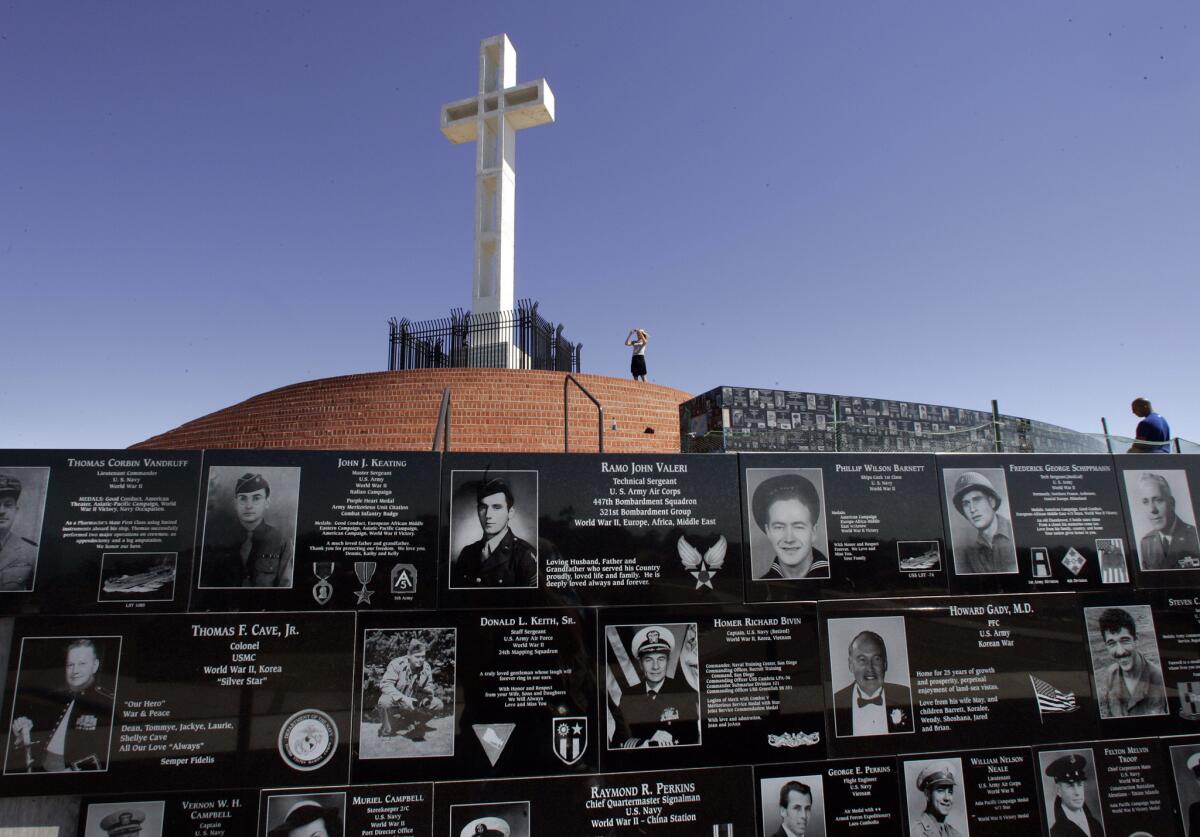Bill aims to keep cross on Mt. Soledad in San Diego, ending dispute

- Share via
An amendment to a bill pending in Congress would permit a 43-foot cross to remain atop Mt. Soledad in San Diego – in hopes of ending an emotional, divisive legal battle that has raged for more than two decades.
Rep. Duncan Hunter (R-Alpine), who served in Iraq and Afghanistan as a Marine officer, sponsored an amendment to a complex military policy bill that would authorize the secretary of Defense to, in effect, sell the property to the Mt. Soledad Veterans Memorial Assn., a private, nonprofit group that wants the cross to remain.
The bill passed the House last week and is expected to pass the Senate this week.
Whether the provision would persuade the federal courts to allow the cross to remain is unclear.
A similar land-sale approved by San Diego voters was struck down by the courts but that was before the land was turned over to the federal government in 2006 by the San Diego City Council, which had grown weary of the court case.
Since the late 1980s, opponents who believe the cross violates the constitutional separation of church and state have battled in court to have the cross removed. Erected in 1954, the cross is one of San Diego’s most visible landmarks, able to be seen from Interstate 5.
The opponents have won nearly all the legal rounds except for a 2008 ruling by a San Diego federal judge that said the cross could remain – a ruling quickly appealed and then overturned in 2011 by the 9th Circuit Court of Appeals.
Still, no judge has been willing to set a firm date for taking down the cross.
Meanwhile, thousands of plaques honoring veterans of all faiths have been affixed to walls surrounding the cross beginning in the 1990s. The plaques program is supervised by the memorial association.
An annual Memorial Day service at the site attracts politicians of all stripes. In 2013, the service honored two former Navy SEALs from San Diego killed in the attack on a U.S. consulate site in Benghazi, Libya.
The case remains on appeal at the 9th Circuit and some cross proponents believe it will ultimately be decided by the U.S. Supreme Court, which has twice declined to hear the case until all appeals have been decided.
The court fight pits the ACLU, representing the Jewish War Veterans Assn., and attorney James McElroy, representing Steve Trunk, an atheist and Vietnam veteran, versus Department of Justice attorneys and those for several conservative nonprofit groups including the Dallas-based Liberty Institute.
The ACLU position is that while it supports religious freedom and respect for veterans, it remains opposed “to the government sponsoring, endorsing, promoting or financing religious symbols.”
Hunter and other proponents for keeping the cross on Mt. Soledad argue that it is a war memorial akin to others on federal property that have passed constitutional muster with the courts.
Shifting the property to the memorial association, Hunter said, “alleviates the criticism that it is government controlled property.” The association, he said, is committed “to ensuring the memorial stands in recognition of our veterans.”
McElroy said that the Mt. Soledad case could be influenced by a 2012 court decision that permitted a cross on National Park Service property in the Mojave Desert as long as the land was transferred to a veterans group.
But McElroy noted that the Mojave cross was small, located in a remote location, and was erected by veterans. The Soledad cross, by comparison, is large, highly visible in a big city, and was for decades a civic-sponsored effort.
Still, McElroy said all parties might be willing to reach a compromise to satisfy what the courts have called, without being specific, “other remedies” to the dispute.
“I think 25 years is probably long enough to litigate a case,” he said.
More to Read
Sign up for Essential California
The most important California stories and recommendations in your inbox every morning.
You may occasionally receive promotional content from the Los Angeles Times.













